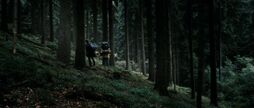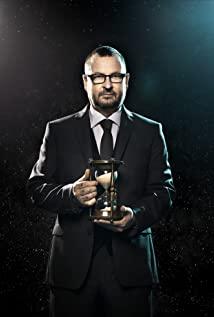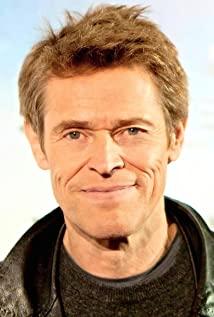The title of "The Antichrist" comes from Nietzsche's book of the same name, and the chalk-effect inscription on the blackboard is written like this, in a morbidly beautiful blackboard style. After investigation, it was found that Nietzsche's "Anti-Christ", the difference between a "person", I don't know if it is the difference between behavior and actor, so I saved Nietzsche's writings for later spiritual rumination, or can't wait to wait first. Watch the video soon.
Prelude:
Black and white film, slow-motion pictures, accompanied by a soulful opera-style bel canto, the nearly 6-minute prelude explains the cause of the story in a beautiful and moving way. A couple who were enjoying the fun of fish and water did not notice that their innocent child climbed up the window sill and fell to his death. The plot was heart-wrenching from the start. The sex scenes are really amazing, unlike those ordinary sex scenes, where the dew point is good, and the action is good, but the direct close-up of the penis forcefully enters, and the directness is dazzling.
Chapter 1: Grief.
This chapter is logical, just want to see how the mood in the prelude will develop. The first half is also expected, the wife has a series of reactions such as self-blame, pain, seeking death, reflection, complaining, doubt, denial, self-mutilation, making love, and hurting. That segment of the physiological reaction that describes anxiety, the perspective is very empathetic, dry eyes, dry throat, trembling hands, increased breathing, and rapid pulse. As a husband who understands psychology and medicine, started helping his wife find what scares her, then healed herself by confronting her inner fear, understanding what is a natural reaction, what is a dangerous reaction, what to be afraid of, what to be afraid of place. So the wife confessed that what she was afraid of was Eden's forest. The previous year, the wife took her child to write a thesis here. It was the last summer she spent with her son. Now, the pain of losing her child makes her afraid of everything there. But just like the scene at the beginning of this chapter pushing the sewage in the vase, everything started to become chaotic. Since then, the tone of the film has even changed, becoming very literary, illusory, and even neurotic. On the train to Eden, a ferocious face flashed through the window. Charlotte Gainsbourg, who played the wife, and Willem Dafoe, who played the husband, were terrifying enough. Oh, when it appeared like this, I was instantly horrified, and I didn't dare to look down. The film also specially arranged for the wife to enter Eden in advance under hypnosis. This kind of treatment is also to set the tone for this forest. Naturally, there is no tone. Because of the fear in the characters, there is a terrifying black color. Unreal beauty. At the end, there is a fawn running away in panic, which is a clue, which will be discussed later.
Chapter 2: Pain (Chaos reigns)
This chapter is a transitional chapter, from a simple physical fear to a chemical reaction-like deep fear, from a simple tragic story to a philosophical issue of antichrist. There are two metaphors, two cures, and two discoveries. The first metaphor is rather obscure. It is an acorn. The acorn falling from the roof renders a terrifying sound effect atmosphere. At the same time, the seed is a metaphor for a child, and the same falling symbolizes the death and reproduction of life. The second analogy is much more direct. The young bird that fell out of the nest is full of ants and is immediately eaten by the eagle. The visually dense and disgusting picture seems to have been favored by the director to a large extent, and even formed a style. The first treatment was direct and action-oriented. The husband helped his wife overcome her fear of the bridge by walking the stones. The second treatment is inward and conscious. The wife can always hear the cry of the child in the forest, but this is what she imagined. The husband told her that if your fear really exists, you can Save you, but if you don't, you will fall into deep self-fear, fear will only affect your judgment of reality, and the wife then claims that Satan is God, and the most fearful thing is not nature, but Satan, which is already obvious. Entered the level of antichrist. The first discovery was the source of the disease in consciousness. The husband saw that the wife had placed pictures of the slaughter of women on the roof. It turned out that the wife's paper was about Christ and anti-female, but the wife put "evil is hurting women." ” was misinterpreted as “women are inherently evil”, and thus released her deep sense of guilt and evil, so that her notes appeared in chaotic and neurotic fonts. The second discovery is the symptom of the movement caused by consciousness. The husband found that the autopsy report said that the child's feet were a little deformed, and in the photo of the mother and child getting along in the forest last year, the child's shoes were all left and right. Contrasted. Immediately, the husband realized that his wife's mental state was already bad before he lost his son. At this moment, the wife told her husband in a light-hearted manner that she felt better, and could see the deep worry and fear in her husband's eyes. At the end, there is still a stylized clue, a talking fox (or a wolf? This judgment is to match the later film), which says "chaos, the beginning".
Chapter 3: Despair (Women's Slaughter)
The development of the plot in this chapter is advancing rapidly, until the climax, the emotions are enlarged geometrically, and the shock level of the picture is also at its peak. The first is that the wife asks her husband to hit her and hurt her during sex, otherwise she doesn't love her. I don't know if this can explain SM's psychological expectations. Then, masturbate! The wife masturbates spasmodically under the roots of the tree, and then has sex with her husband naked. At this time, the most bizarre scene in the whole film appears. The dense hands stretch out from the roots, as if expressing a deformed desire. The poster of the film was made based on this main vision. At that time, I thought it was a need for graphic art processing. It was not until I saw the dynamic picture that I realized that the poster was completely realistic. It was really, a little, disgusting. The next thing made me feel that all the gods and horses before were floating clouds, completely disgusting. When the wife was having sex, she slammed her husband's erect penis and squeezed out the blood spattering with her hands. There was no wife who gave up completely. Losing his mind, in order not to let his husband leave him, he used a drill to pierce his calf while he passed out, traversed the iron bar, put on a grinding wheel, and finally screwed the nut and threw the wrench into the room. in the open space below. The husband woke up and instinctively dragged his heavy injured leg to hide in the hole under the root of the tree. The naked wife found out that her husband was missing, so she shouted hysterically in the forest to search for it, and finally the sound of the chicks in the hole was exposed. The husband's hiding place, the wife went completely crazy, and finally shoveled the soil with a shovel. In this chapter, the husband has changed his wife's greatest fear of Satan to herself.
Chapter 4: The Three Beggars.
It turned out that the wife did not shovel her husband to death, but dug him up, dragged him back to the wooden house, and apologized to her husband again. However, in the blink of an eye, the wife said that she could not find the wrench and could not help her husband remove the grinding disc. The husband tremblingly asked if she wanted to kill him just now, and the wife said with blurry eyes that when the three beggars arrived, someone must die. These three beggars are the clues revealed in the first three chapters: the deer, the wolf, and the eagle, which are derived from Yeats' religious poetry. I found the poem interspersed, and saved it for a while to interpret it, or come back to watch the film. Unexpectedly, my wife started masturbating again, and took a pair of scissors and cut her clitoris with one knife, I rely on it! After watching this movie, I don't want to have sex anymore. This crazy woman actually gave herself and her husband to the palace. I tried to understand her morbidity, because when I was studying female slaughter, I had a problem with consciousness and belief, and then I lost a child when I had sex with my husband, so I hated sex desperately, which directly led to the destruction of sexual organs, But the irony is that children are born because of sex, which is an inner tangle that suffers from the birth and death of life. Eventually all three animals arrive, and the husband accidentally finds the wrench and removes the grinding wheel, again depicting anxiety, this time with the wife strangled to death. He really saved her in the end, freeing her by dying. The picture again stylistically appears densely packed all over the mountains and plains, this time it is all nude.
Postscript
The same black and white film, the same slow motion picture, accompanied by the same soulful opera-style bel canto, the child is a toddler, the husband who is full of scars is overlapped, and the three animals appear again, again densely packed The people flocked to the hut like ants. This is a complete conclusion. This is a completely tangled film.
After Nietzsche had a literary talent
, when I read through Nietzsche's Antichrist, on the surface, there was no direct connection between the book and the film. Certainly, Nietzsche was not a playwright. But in the deep-level philosophy, beliefs, and values, there is a profound influence on the core.
Nietzsche first wisely defines his readers in the book, gagging the mouths that retort. It then redefines his understanding of good, evil and happiness. "Anything that increases our human sense of power, our human will to power, and power itself, is good. Anything that springs from weakness is evil. Happiness is nothing but the awareness that power is growing, that resistance is The feeling of overcoming."
It may be because of the criticism of Nietzsche through Lu Xun's article when he was in school, the impression of this person is only that he learned the word "self-proclaimed god", and he went crazy later (do not know this crazy and this There is no comparable meaning in the film Wife's Madness), that's all, there is no good impression of recognition. At the same time, I grew up under the belief of Marxist materialism and atheism, and naturally I didn't have a good impression of Christianity, and I didn't even agree with it. So, I can keep a neutral attitude and continue reading.
I have roughly categorized Nietzsche's antichrist argument from five aspects, and I'm also looking for clues related to the film.
First: The Law of Survival
Nietzsche said: "The weak and the defeated should perish. This is the first law of our love for human beings. People should even help them to perish themselves. When a certain animal, a certain race, or I call an individual depraved when he loses some of his instincts, when he chooses and when he prefers what is not to him. Man should not be regarded as derived from "spirit" or "divine" Yes, we put man back into animals. Man is the most failed animal among all animals, the most sick animal, because he is the most dangerous animal that has lost his instincts. People always talk about beliefs, but people always Acting based on instinct.”
I myself agree with 90%, and I think that 10% are true and realistic, but after all, people are not completely animals, and people have feelings, even if it is all about The hypocritical feelings of self-deception, but I still feel that I can distinguish it from animals because of this, and I do not violently adopt the animal's law of survival of the fittest.
Second: Sympathy floods
Nietzsche gritted his teeth and said: "What could be more harmful than any vice? Yes, this is sympathy, that is, sympathy for the behavior of all failures and weak people. The effect of sympathy is depression. The time to sympathize is to go Sympathy desperately protects the losers, and it is precisely because the world is full of losers that the world has a view that life itself is depressive and suspicious. Because of compassion, life is denied. Sympathy promotes There is nothingness, but people say it is Nirvana, salvation, bliss, aren't these nothingness? Sympathy needs to be completely eliminated with laxatives, and tragedy is such a laxative."
I agree 100%, but the question that follows is, how should What about the weak? Really help them perish? Is this humane? Unbearable to answer.
In these two points, in the film, is the husband's affection for his wife a kind of sympathy that violates the law of existence? Still unable to answer.
Third: Anti-Christian
Nietzsche advertised: "Christianity destroys all reason that is contained in the noblest and most powerful nature, and he destroys it by preaching to everyone that the highest value of spirituality must be regarded as sinful All the values by which man today sums up his highest aspirations are decadent values. Pure spirit is pure lies. The most valuable insight is the method, but the method is often despised. A nation proud of itself Naturally, there is a need to worship a God. People are full of gratitude for themselves, so they need a God. God is the God of the weak, and only the weak can have God, but they do not call themselves weak, they say they are kind people. The concept of God is fake, the concept of morality is fake. The priest lives by sin because God forgives the repentant and God forgives those who obey the priest. Christianity is the revolt of all that crawls to the ground against that which has a height. With Morality leads man by the nose, and that is the best thing. The principle of Christian love is that in the end it needs to be well rewarded. God created man, and to God man is a distraction. The church It is treating the whole world as a lunatic asylum. The Renaissance is a reassessment of the various values of Christianity. One should have the courage to abandon any predicament that runs counter to one's deepest interests, and Christianity lives by it, creating All kinds of predicaments, in order to make oneself eternal."
I don’t want to say anything about other people’s beliefs. I don’t believe in Christ myself, just like I don’t completely believe in our Lao Tzu. Some of them can be used for reference, while others are not to be contaminated. Just take the essence and discard the dross. However, what I am interested in is to find out, how do many people believe it? In the film, too, I really want to know, how did the wife get so obsessed with the study of female slaughter? Maybe I don't know, maybe in the process of knowing, I will let myself follow in its footsteps, haha.
Fourth: Comparing Buddhism
may be in order to compare Christianity, but Nietzsche still affirmed Buddhism: "Buddhism is more realistic than Christianity. He no longer says "fight against sin" but only "fight against pain", which is far more than Beyond good and evil. Buddhism is based on two physical facts: one, an oversensitivity to the subtlety of suffering, and two, an over-spiritual focus on concepts and logic. These two physical facts contribute to repression, so Fighting with methods of hygiene. Vegetarianism, abstinence, wandering, etc. As a result there is neither a peaceful nor a pleasant view, he invented a method of disengagement from others, he sees kindness and kindness as things that can promote health Selfishness becomes an obligation, a necessity. Buddhism never promises but maintains, Christianity promises everything but maintains nothing.”
I also think Buddhism is a relatively worthy religion, but I personally don’t like it very much. Although the detached attitude that downplays the joys and sorrows can relieve suffering and cultivate one’s self-cultivation, is there any energy to live without emotion, without suffering and without joy? Still living so long, doesn't it feel very long?
Fifth: Anti-Semitic
Nietzsche said without hesitation: "German philosophy hates God, God is a Jew. The Jews choose to survive at any cost with an unabashed consciousness, and this price is the extreme falsification of the whole nature and falsification of all The naturalness of the people, falsifying all truth, and the whole world inside and out. They interpret all happiness as reward, and all misfortune as punishment for not yielding to God. When reward and punishment have abolished natural cause and effect, all It's the opposite. Judging by the degree of obedience is reward or punishment. The protective wall of the law, one is the apocalypse, which is sacred, that is, perfect, and the other is tradition. Doubt about tradition is disrespect to one's ancestors. and crime. As if these two were irresistible, powerless truths. The law is but the natural approval of the sovereign."
Thinking of the slaughter of Jews in World War II, I don't want to say that I am also sympathetic. Just talking about the killing party is not an act that can be applauded. In addition, is it possible to be extreme when commenting on the character of a nation? Are all Jews like that? And, what is not said is, why is this nation like this? It is also a human being, but you have only made distinctions, but have not explained why it has become like this. Isn’t this a kind of subjective arrogance?
To be fair, even if there are differences, I still appreciate Nietzsche's talent very much. Haha, after all, I have heard too much orthodox education since I was a child, and listening to strange voices and thoughts is very open to understanding. And between the lines, you can feel his pride filled with righteous indignation. Nietzsche is also a man of temperament!
The full excerpt from Yeats' "The Three Beggars"
reads: "Although I have been standing here since the dawn
of the day in the water soaking my feathers, I have not found anything to eat, for only rubbish comes to me. Am I going to make a living from small trash fish?" The old crane of Guo Te grumbled. "Exhausting all your energy and living on small fish?" King Gui'er walked in his court, the palace courtyard and the Yushui River, where he said to three old beggars: "You have wandered far and wide, and you will surely be able to Solve the mystery in my mind. Do people want less and get more, or more and more and more?" A beggar said: "No man or demon can make him tired the most, unless desire makes his muscles tense . What can make them like this?" But Guil laughed cryptically: "If this is as true as it seems, one of the three of you is a rich man,
For the first to fall asleep will
receive a thousand pounds, provided he
falls asleep before noon on the third day. So
, fond of like a bird, and
with his old thoughts in mind, King Gir
left the river and the courtyard of the palace,
leaving them arguing.
"If I win," said one of the beggars,
"even though I When I'm old, I will still persuade
a pretty girl to share my bed with me";
the second: "I will learn a trade";
the third: "I will go to the racetrack,
crowded among the other gentlemen In the middle,
put all your money on a horse";
the second: "I thought about it again:
it's more respectable to be a farmer. '
Sighing and shouting against each other: the beggars' indiscriminate fantasies of
arrogance and idleness sing through their lips and teeth from noon to noon; and when the second twilight brings the frenzy of the beggars' moon, neither does anyone else . Never closing his bloodshot eyes, just trying to keep his mates sleepy; all yelling until they were furious. They tore each other into a bunch. They beat and bit all night; they beat again and biting until the light of day; they hammered and bitten all day, until another night, or if they rested a little, they squatted down and cursed and rebuked, when the old Gir came and stood When the fairy tale came to an end in front of these three people,
They were covered in blood and lice.
"Time's up," he shouted,
all three staring at him with bloodshot eyes.
"Time's up," he shouted, and the three
fell into the dust, snoring.
"Maybe I'll have luck,
now that they're quiet," said the crane. "Even though I've been standing like a stone
in the water with my feathers dipped in it, watching the rubbish run around, there must be trout out there, maybe I'll catch one, if only I Appears indifferent." This is a poem about desire. At the heart of this lies the question and answer: "Do people desire less and gain more, or desire more and more?" "Neither man nor demons can make them tired get the most, unless desire makes their muscles tense. , what can make them like this?" Desire has become the driving force of greed, and desire is addictive, making people endlessly crazy in the behavior of satisfying desire, unable to extricate themselves, desire itself is a form of rivalry with oneself, but Man does not feel tired at all until he dies. Going back to the film, it actually maps two desires. First, the wife's desire to seek physical sex. It can be seen in the film that the wife is almost crazy about sex. Until the death of her son, this desire develops in a perverted direction and finally solves her own sexual organs. Second, the wife's desire to seek spiritual liberation, mentally, the wife has been in a state of self-torture, and she indulged in it until she was completely mad and strangled to death. The performance of these two aspects also answers the question about desire. The answer given by the film is: the more desire, the less income.
View more about Antichrist reviews










